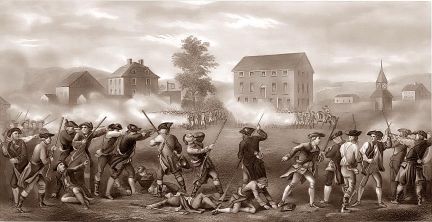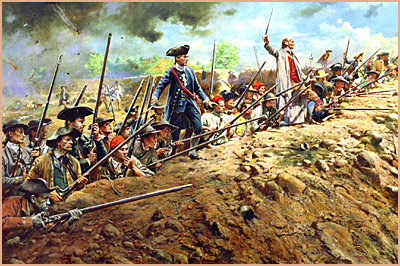 Ezekiel Olds
Ezekiel Olds
Ezekiel is my 7th Great Grandfather
 Ezekiel Olds
Ezekiel Olds


About 700 British Army regulars, under Lieutenant Colonel Francis Smith,
were given secret orders to capture and destroy military supplies that were reportedly stored by the
Massachusetts militia at Concord. Through effective intelligence gathering, Patriot colonials had
received word weeks before the expedition that their supplies might be at risk and had moved most of
them to other locations. They also received details about British plans on the night before the battle
and were able to rapidly notify the area militias of the enemy movement.
The first shots were fired just as the sun was rising at Lexington. The
militia were outnumbered and fell back, and the regulars proceeded on to Concord, where they searched
for the supplies. At the North Bridge in Concord, approximately 500 militiamen fought and defeated
three companies of the King's troops. The outnumbered regulars fell back from the minutemen after a
pitched battle in open territory.
More militiamen arrived soon thereafter and inflicted heavy damage on
the regulars as they marched back towards Boston. Upon returning to Lexington, Smith's expedition was
rescued by reinforcements under Lieutenant-General Hugh Percy. The combined force, now of about 1,700
men, marched back to Boston under heavy fire in a tactical withdrawal and eventually reached the safety
of Charlestown. The accumulated militias blockaded the narrow land accesses to Charlestown and Boston,
starting the Siege of Boston.


Was the order passed along the front lines of the militiamen as the
British troops moved toward them. When that moment came, the word "FIRE!" was shouted, and whole enemy
platoons were mowed down and shattered, retreating to the foot of the hill.
In all of the twenty battles of the Revolution, Bunker Hill exacted a
heavy toll on British officers. In this one battle alone one-eighth of the British officers in the
entire War were killed and one-sixth were wounded on that day.
Following the earlier skirmishes at Lexington and Concord, the battle of Bunker Hill was significant in that it overruled any real hope of conciliation. The outcome of the battle rallied the colonies and moved a lethargic Congress to take action. Bunker Hill showed the Americans that the British were not invincible. It showed the British Government that the "rebels" were a serious opponent, that "the mightiest army in all of Europe" had a real fight on its hands.